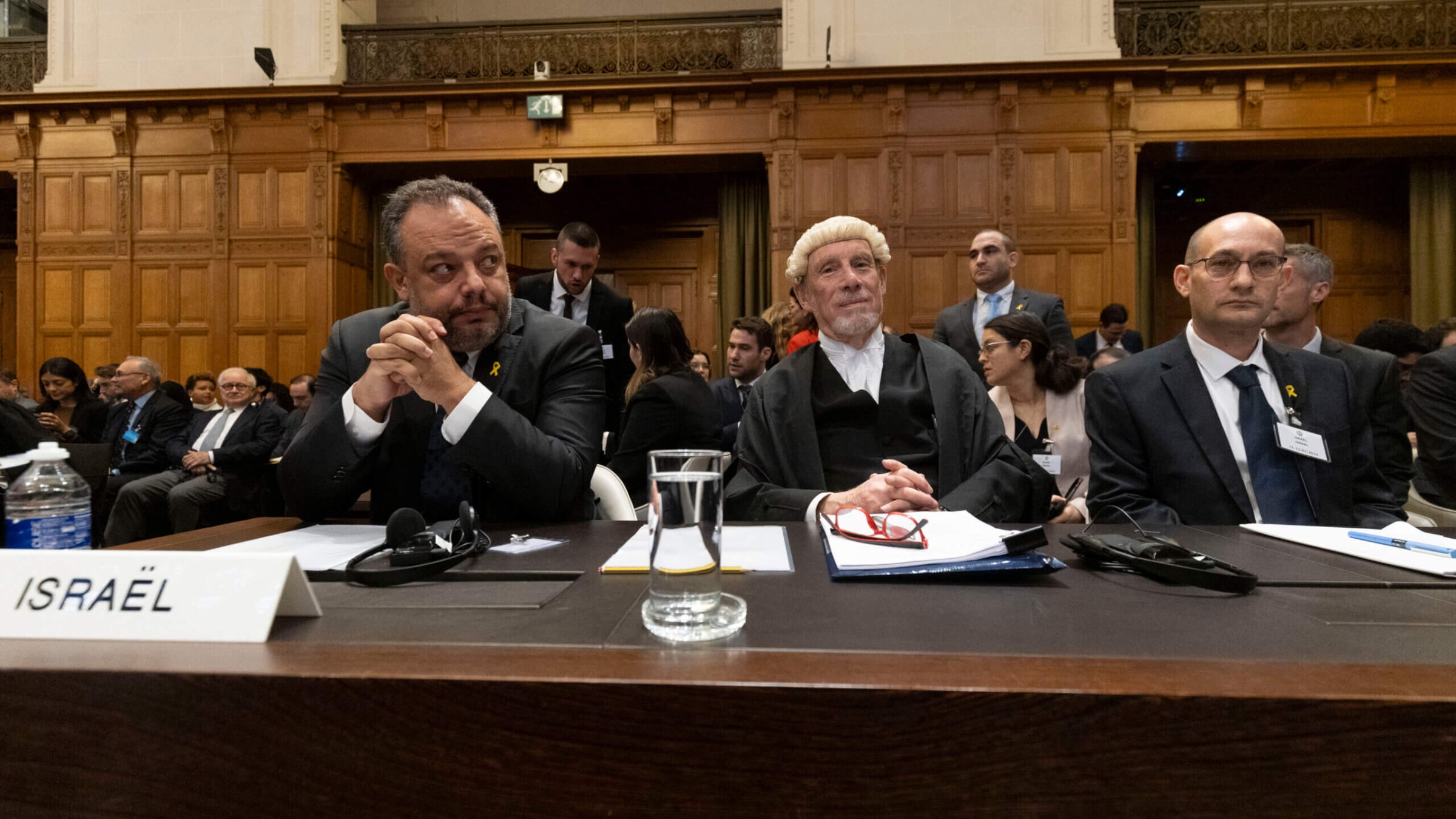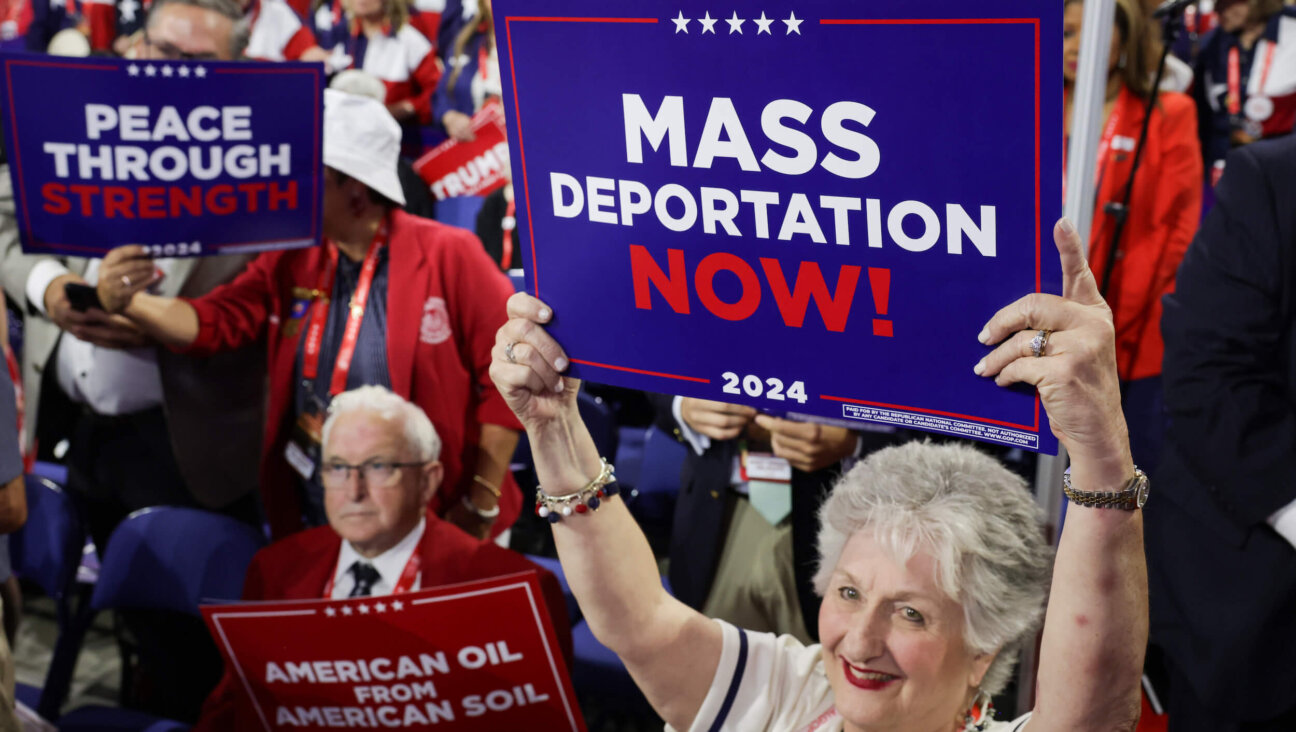Both sides claimed ICJ ruling as a victory
Palestinian and Israeli advocates have claimed victory at the UN Court in the case South Africa brought against Israel

(L-R) Israeli legal counsellor Tal Becker, barrister Malcolm Shaw, and Gilad Noam wait to present Israel’s argument before the International Court of Justice, Jan. 12, in The Hague, Netherlands. Photo by Michel Porro/Getty Images
Earlier this month, the International Court of Justice in the Hague heard South Africa’s case alleging Israel is carrying out a genocide against Palestinians in Gaza, and demanding the Israel Defence Forces suspend its military campaign against Hamas terrorists there. Last week, the court issued a ruling on the matter, ordering several provisional measures.
Then, something curious happened: Supporters on both sides claimed victory.
The BDS movement hailed the ICJ ruling as a “major defeat for Israel.” Israeli government spokesperson Eylon Levy boasted that “the court threw out South Africa’s attempts to get an immediate stop to the war that would leave Hamas free to re-offend.”
These two assessments of the same ruling are hard to square with one another. Yet there’s a kernel of truth to each, as the different parties highlight portions of the ruling most convenient to their narrative.
For the Palestinians, their South African advocates and other sympathetic voices, the issuing of provisional measures — interim orders from the Court — represents a key victory. Israel had called on the Hague to “reject the request for the invocation of provisional measures.”
While the court did not determine that Israel had necessarily violated the 1948 Genocide Convention, this past week’s ruling only pertains to provisional measures that South Africa had requested and Israel hoped to avoid altogether. The court determined that the case falls under its purview (Israel, for its part, argued that South Africa failed to prove jurisdiction). Now, the ICJ will continue to examine the case. In fact, the ICJ’s provisional measures direct Israel to report on its compliance within a month. In essence, Israel is on notice.
Still, Israel can genuinely point to a fundamental victory of its own. The first provisional measure South Africa asked of the ICJ was for the IDF to halt their fight against Hamas in Gaza. The court declined this key request.
If the court had fulfilled South Africa’s appeal, it’s unlikely Israel would have followed the Hague’s orders, given the stakes involved in the conflict with Hamas. Now, however, the IDF is spared the awkward situation of waging a war with an international court order to stop fighting hanging over it. South Africa’s application to the court suggested that “provisional measures requested are … consistent with and capable of assisting towards the progression and resolution of” the release of Israeli hostages in Gaza. However, the ICJ ultimately called for the release of the captives without demanding an end to the Israeli operation.
As for the rest of the provisional measures, such as protecting civilians and ensuring the military does not commit acts of genocide, Israel can abide by these demands. Israel was already bound by the Genocide Convention, which it signed in 1949. Jerusalem and its allies will claim that much of what the ICJ calls for is in line with standing Israeli policy. In fact, the Biden administration has already employed this very framing.
On Friday, the U.S. State Department described the ruling as “consistent with our view that Israel has the right to take action to ensure the terrorist attacks of Oct. 7 cannot be repeated, in accordance with international law.” Meanwhile, Aharon Barak, whom Israel appointed to the ICJ, actually voted in favor of two of the judgments, including increased humanitarian assistance and a call to punish incitement to genocide. The latter is a reference to incendiary rhetoric from a number of Israeli politicians and military officials — some of it mistranslated, much of it sadly quite real.
The court’s ruling and a number of the judges’ accompanying declarations added context that supports the Israeli worldview, or at least acknowledges it. The ICJ’s chronology begins with Hamas’ barbaric Oct. 7 terror attack. Judge Georg Nolte noted the Jewish state’s sensitivity to charges of genocide given the deep connection between international law and the legacy of the Holocaust (even as he affirmed that this history is insufficient to dismiss the case).
Part of the problem in understanding recent events at the Hague is that some Palestinians, Israelis, and their respective supporters prejudged the process from the start. From that baseline, no ruling was ever likely to change many minds. For those who accepted South Africa’s genocide charges, the very fact that the case made it to the ICJ already validated their analysis. After all, the Israelis wanted the case to be simply thrown out.
For Israel and its friends, the accuser and the venue were already illegitimate. For most Israelis, dictates from unfriendly international fora like the UN don’t matter. A harsher ruling would have been dismissed out of hand, with the Israeli Foreign Ministry already having branded Pretoria as the “legal arm of Hamas.”
That label may be a touch hyperbolic, but, as Julia Sebutinde — the only judge to vote against all six provisional measures — noted in her dissent, South Africa does maintain a “cordial relationship” with Hamas.
Legal proceedings in the International Court of Justice can be a protracted affair. In Bosnia and Herzegovina v. Serbia and Montenegro, the court issued provisional measures — the same type of orders recently handed down from the Hague in the Gaza case — in 1993, at the height of the Yugoslav Wars. A final judgment was only reached in 2007.
For now, Israelis and Palestinians will point to elements of the ICJ’s recent ruling that best suit their needs. Nevertheless, Friday’s decision will not be the last word in this story; it is only the first chapter in what could be a yearslong drama.
To contact the author, email [email protected].























